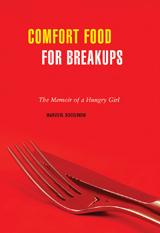Comfort Food for Breakups: The Memoir of a Hungry Girl

“Soup can sometimes take the place of language...” Marusya Bociurkiw writes in Comfort Food for Breakups, and as the aroma of my mother’s broth, sipped to ease sickness, floods my tongue, I too hunger for my mother’s absent touch, for my young daughter knees, for my queer body.
Born in Canada to Ukrainian exiles, Bociurkiw weaves stories interspersed with recipes, travels, and tales of other refugees. Food is the conduit that allows her to traverse centuries and continents, a movement that turns meals and particular dishes into landmarks. Between two or more people, the preparation and ingestion of food becomes for her a conversation, one that revolves around fullness and emptiness, absence and presence.
In Bociurkiw’s hunger-propelled memoirs, food, entwined with the senses, connects her to blood, to her body, to stories and memory. Eating and cooking are central to rituals of celebration, mourning, and gossip that engage her family, friends and lovers. During a romantic break-up she loses her appetite, yet the death of her brother makes her hungry.
It is through the landscape of the kitchen that Bociurkiw explores her connection to her mother’s body, her grandmother’s body and a matriarchal lineage in which she finds herself entangled. Her relationship to food allows her to break apart her own constructed femininities, against which her queerness acts as a transformative catalyst, informing how she inhabits her desire.
As Bociurkiw repeatedly returns to Ukraine and Vancouver, both in journey and in memory, she searches for the precise ingredients that feed her hunger. Whether opening her door to a stranger or taking care of a loved one, food becomes her language, a form of communication that stands in for what she finds difficult to say. Between immigration, silence and belonging, she hungers to taste something familiar in a strange place. She eats to get back home.